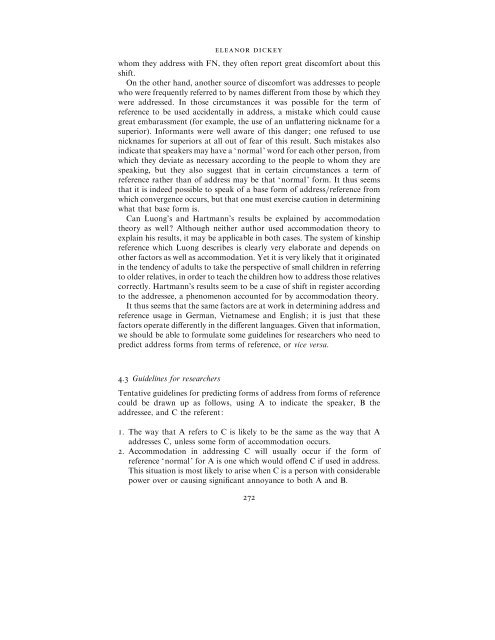Forms of address and terms of reference - Exeter Research and ...
Forms of address and terms of reference - Exeter Research and ...
Forms of address and terms of reference - Exeter Research and ...
Create successful ePaper yourself
Turn your PDF publications into a flip-book with our unique Google optimized e-Paper software.
eleanor dickey<br />
whom they <strong>address</strong> with FN, they <strong>of</strong>ten report great discomfort about this<br />
shift.<br />
On the other h<strong>and</strong>, another source <strong>of</strong> discomfort was <strong>address</strong>es to people<br />
who were frequently referred to by names different from those by which they<br />
were <strong>address</strong>ed. In those circumstances it was possible for the term <strong>of</strong><br />
<strong>reference</strong> to be used accidentally in <strong>address</strong>, a mistake which could cause<br />
great embarassment (for example, the use <strong>of</strong> an unflattering nickname for a<br />
superior). Informants were well aware <strong>of</strong> this danger; one refused to use<br />
nicknames for superiors at all out <strong>of</strong> fear <strong>of</strong> this result. Such mistakes also<br />
indicate that speakers may have a ‘normal’ word for each other person, from<br />
which they deviate as necessary according to the people to whom they are<br />
speaking, but they also suggest that in certain circumstances a term <strong>of</strong><br />
<strong>reference</strong> rather than <strong>of</strong> <strong>address</strong> may be that ‘normal’ form. It thus seems<br />
that it is indeed possible to speak <strong>of</strong> a base form <strong>of</strong> <strong>address</strong><strong>reference</strong> from<br />
which convergence occurs, but that one must exercise caution in determining<br />
what that base form is.<br />
Can Luong’s <strong>and</strong> Hartmann’s results be explained by accommodation<br />
theory as well? Although neither author used accommodation theory to<br />
explain his results, it may be applicable in both cases. The system <strong>of</strong> kinship<br />
<strong>reference</strong> which Luong describes is clearly very elaborate <strong>and</strong> depends on<br />
other factors as well as accommodation. Yet it is very likely that it originated<br />
in the tendency <strong>of</strong> adults to take the perspective <strong>of</strong> small children in referring<br />
to older relatives, in order to teach the children how to <strong>address</strong> those relatives<br />
correctly. Hartmann’s results seem to be a case <strong>of</strong> shift in register according<br />
to the <strong>address</strong>ee, a phenomenon accounted for by accommodation theory.<br />
It thus seems that the same factors are at work in determining <strong>address</strong> <strong>and</strong><br />
<strong>reference</strong> usage in German, Vietnamese <strong>and</strong> English; it is just that these<br />
factors operate differently in the different languages. Given that information,<br />
we should be able to formulate some guidelines for researchers who need to<br />
predict <strong>address</strong> forms from <strong>terms</strong> <strong>of</strong> <strong>reference</strong>, or vice versa.<br />
4.3 Guidelines for researchers<br />
Tentative guidelines for predicting forms <strong>of</strong> <strong>address</strong> from forms <strong>of</strong> <strong>reference</strong><br />
could be drawn up as follows, using A to indicate the speaker, B the<br />
<strong>address</strong>ee, <strong>and</strong> C the referent:<br />
1. The way that A refers to C is likely to be the same as the way that A<br />
<strong>address</strong>es C, unless some form <strong>of</strong> accommodation occurs.<br />
2. Accommodation in <strong>address</strong>ing C will usually occur if the form <strong>of</strong><br />
<strong>reference</strong> ‘normal’ for A is one which would <strong>of</strong>fend C if used in <strong>address</strong>.<br />
This situation is most likely to arise when C is a person with considerable<br />
power over or causing significant annoyance to both A <strong>and</strong> B.<br />
272
















